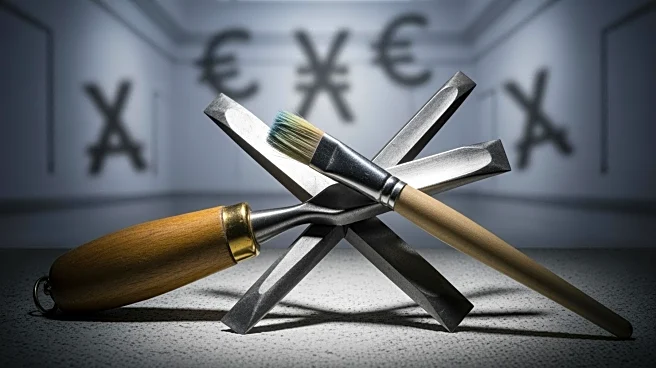What's Happening?
Two French parliamentarians, Jean-Paul Matteï of the Democratic Movement party and Philippe Juvin of the Republicans, have proposed a new tax regime on art as part of the 2026 budget. This proposal has been met with significant opposition from the French art world,
including major stakeholders such as Art Basel, auctioneer Drouot, and the Association for the International Diffusion of French Art (ADIAF). The proposed legislation would make France the only major art market to impose a wealth tax on the possession of artworks. Critics argue that this could lead to a contraction in the French art market, potentially resulting in tax losses of up to €578 million ($671.5 million) when considering the auxiliary industries supported by the art market. The proposal comes at a time of political instability in France, with frequent changes in government.
Why It's Important?
The proposed tax could have significant implications for the French art market, which is the fourth-largest in the world and accounts for more than half of the European Union's market value. If implemented, the tax could discourage art ownership and transactions, leading to a decline in market activity. This could impact not only art dealers and collectors but also related industries such as galleries, museums, and auction houses. The proposal has raised concerns about France's competitiveness in the global art market, as it would place French buyers and sellers at a disadvantage compared to their European counterparts. The potential for reduced art transactions could also affect cultural exchange and the visibility of French art on the international stage.
What's Next?
The proposed tax is currently being debated in the French parliament as part of the 2026 budget discussions. Stakeholders in the art industry are likely to continue lobbying against the proposal, emphasizing its potential negative impact on the market and cultural sector. The outcome of these debates will determine whether the tax is implemented or if alternative measures are considered. The art community may also explore ways to mitigate the impact of the tax if it is passed, such as advocating for exemptions or adjustments to the legislation.
Beyond the Headlines
The proposal highlights broader issues of taxation and cultural policy in France. It raises questions about how governments balance revenue generation with the support of cultural industries. The debate also touches on the ethical considerations of taxing art, which is often seen as a public good that contributes to cultural heritage and education. The outcome of this proposal could set a precedent for how other countries approach the taxation of art and cultural assets.
















